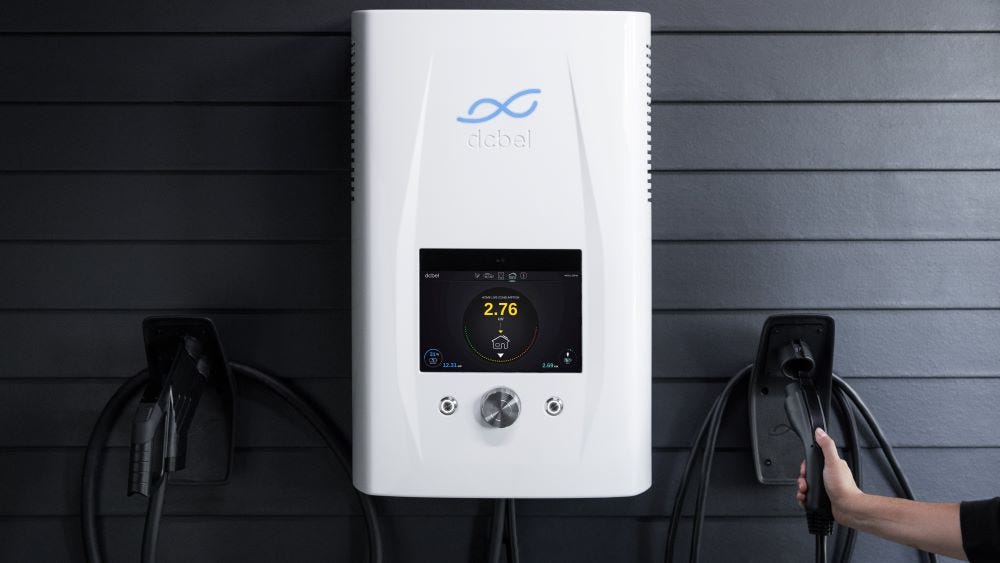CTC #47 - dcbel takes on vehicle-to-grid charging
Plus - Researchers unlock "meaty" alternatives, Ford joins the Quebec battery rush, and Deep Sky and Svante tackle carbon capture
Hey there,
Welcome to another issue of Climate Tech Canada. There’s no doubt that 2023 has been a bad year for wildfires. B.C. is in a state of emergency and 75% of people in Northwest Territories have been displaced. Not to mention Hurricane Hilary in California, a heat dome in the US midwest, and a marine heatwave headed for the Pacific coast. At the same time, there’s folks putting their heads in the sand - politicians going on about “axing the tax” and Suncor’s new CEO saying they need to refocus on the “business drivers of today” instead of “future-focused” low-carbon energy.
I don’t usually start out on such a down note, but it’s hard to ignore right now. The upshot: the past week is a powerful reminder of the scale and impact of the problem we’re working on, and how urgently we need to act.
In this week’s issue, we’ve got:
dcbel raises $67M to unlock the grid
Ford joins the battery rush in Quebec
Deep Sky and Svante team up on carbon removal
📬 Have a deal, upcoming raise, or announcement for the newsletter? Hit reply to let us know.
📌 Post or find a role on our job board.
Subscribe below to get the latest updates on Canadian climate tech and support our work
💰 Funding
⚡️ dcbel (Montreal, QC) raised $67.7M in Series B funding for its vehicle-to-grid charging solution. The round was led by Montreal’s Idealist Capital and included participation from Investissement Quebec. dcbel’s r16 home energy hub acts as the brain for a home’s energy resources including vehicle charging, solar generation and battery storage. It optimizes energy use based on historical data and coordinates with the grid to draw energy when demand is low and sell it back during peak hours. dcbel is one of the only chargers on the market to offer bi-directional charging, and will use the funding to accelerate go-to-market efforts.
🛫 Horizon Aircraft (Lindsay, ON) will list publicly on Nasdaq via SPAC, valuing the company at $96M. Horizon will integrate with Hawaiian special purpose acquisition company, Pono Capital Three. Horizon develops hybrid electric vertical takeoff and landing (VTOL) aircraft.
ICYMI: Climate Drift breaks down Carbon Engineering’s $1.1B exit and what it means - both good and bad - for climate.
📈 Milestones & Growth
Vivid Machines and Moment Energy will join the C100 Fellowship program, developing precision tech for fruit growers and recycled off-grid batteries.
Deep Sky partners with Burnaby’s Svante to explore sequestering carbon in Quebec with Svante’s adsorbent bed solution.
Deep Sky will also partner with XPRIZE to allow carbon capture teams to test their solutions at their Quebec location.
ElectraMeccanica is merging with UK electric truck manufacturer Tevva after running into issues producing its electric, single-occupancy vehicle.
Calgary’s Validere launched its new Carbon Hub product, a software platform to help carbon-intensive industries manage environmental compliance and reduce emissions.
Several climate tech startups are joining Elevate’s Women+ Entrepreneur Incubator including ROCarbon Labs, Ecologicca, Gaia Refinery and more.
🌎 In the news
The federal government is putting up $74M in funding to support small modular reactor (SMR) development in Saskatchewan. The funding will be used for pre-engineering work ad studies, with a decision to build expected from SaskPower by 2029.
Canada paused changes to home appliance energy efficiency rules in order to align with new, higher standards announced by the US government. The new standards come after years of stagnation under the Trump admin.
Rio Tinto will build the largest solar farm in the North, with over 6,600 panels at its Diavik diamond mine. The power plant will provide 5% of operational power and 25% of power during mine closure work.
Ford and South Korean partners will build a $1.2B battery plant in Becancour, QC. The factory will produce Nickel Cobalt Manganese cathodes and is supported by more than $600M in loans from the feds.
Alberta’s electricity prices more than doubled in July, surging 128% due to summer heat, growing population and other factors.
Food scientists at the University of Guelph have developed a way to make plant-based meats with a “meaty” texture using corn protein and a mechanical mouth.
UBC researchers found a way to remove up to 99.9% of microplastics from water using natural plant compounds.
UofT’s Climate Positive Energy and Rotman School of Management launched the Climate Finance Accelerator, a new program designed to address the financial underpinnings of the low carbon transition
📌 Jobs
Visit our job board to see open roles at some of Canada’s most innovative companies, working on smart home energy, commercial EV charging, space-based emissions monitoring and more. Find your next role today:
➡️ Hiring? Add your posting here.
That’s all for this week. Thanks for reading and if you’re enjoying the newsletter, share it with a friend!
Justin



